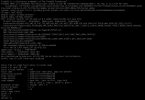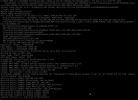FYI: The next Proxmox VE point release 8.1 (2023/Q4) will default to QEMU 8.1.
Internal testing for that version started in July with the first release candidates, since then, our engineers have contributed several complex fixes to the stable release. Today our QEMU 8.1 package has been made available on the pvetest repository. This exact build of the QEMU package has been in QA for over two weeks, powering some of our internal production loads.
Note: While our internal workloads run stable, we do not recommend upgrading production setups just yet, that's why we initially made it available on the pvetest repository.
But, if you have test instances, face issues with older QEMU or QEMU/Kernel combinations that 8.1 might fix, or are just interested to evaluate it early, you now have the opportunity to upgrade early and provide feedback here.
To upgrade,ensure you have the Proxmox VE Test repositories configured (package is now available through the no-subscription repo).
Either use the web-interface, or a console with the following standard commands:
The
Note, as with all QEMU updates: A VM needs to be either fully restarted (shutdown/start or using restart via the CLI or web-interface) or, to avoid downtime, consider live-migrating to a host that has already been upgraded to the new QEMU.
While we successfully run our production and lots of testing loads on this version for some time now, no software is bug free, and often such issues are related to the specific setup. So, if you run into regressions that are definitively caused by installing the new QEMU version (and not some other change), please always include the affected VM config and some basic HW (e.g., CPU model) and storage details.
We'll update this thread once this version has been moved to no-subscription, which could happen as early as next week depending on the feedback.
Internal testing for that version started in July with the first release candidates, since then, our engineers have contributed several complex fixes to the stable release. Today our QEMU 8.1 package has been made available on the pvetest repository. This exact build of the QEMU package has been in QA for over two weeks, powering some of our internal production loads.
Note: While our internal workloads run stable, we do not recommend upgrading production setups just yet, that's why we initially made it available on the pvetest repository.
But, if you have test instances, face issues with older QEMU or QEMU/Kernel combinations that 8.1 might fix, or are just interested to evaluate it early, you now have the opportunity to upgrade early and provide feedback here.
To upgrade,
Either use the web-interface, or a console with the following standard commands:
Bash:
apt update
apt full-upgradeThe
pveversion -v (or the web-interface's Node Summary -> Packages versions) output should then include something like pve-qemu-kvm: 8.1.2-1Note, as with all QEMU updates: A VM needs to be either fully restarted (shutdown/start or using restart via the CLI or web-interface) or, to avoid downtime, consider live-migrating to a host that has already been upgraded to the new QEMU.
While we successfully run our production and lots of testing loads on this version for some time now, no software is bug free, and often such issues are related to the specific setup. So, if you run into regressions that are definitively caused by installing the new QEMU version (and not some other change), please always include the affected VM config and some basic HW (e.g., CPU model) and storage details.
We'll update this thread once this version has been moved to no-subscription, which could happen as early as next week depending on the feedback.
Last edited:



